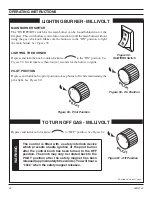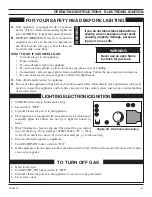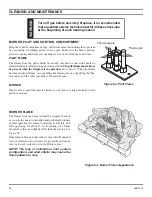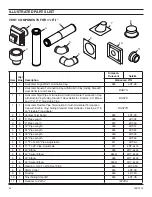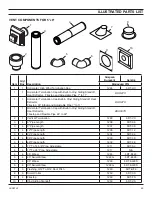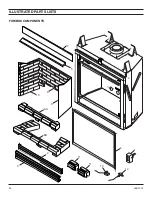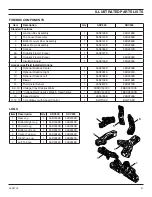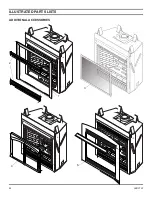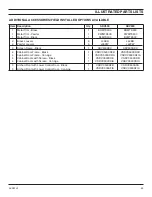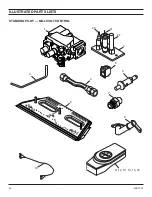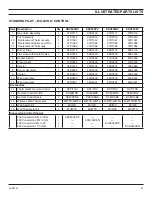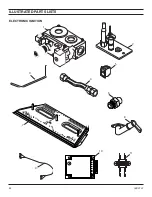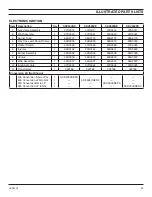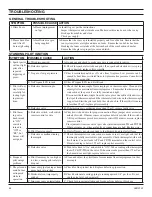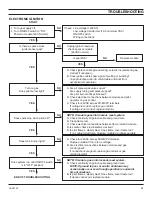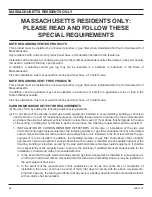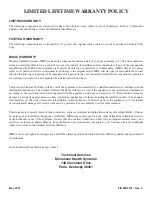
54
56D2161
STANDING PILOT IGNITION
TROUBLESHOOTING
SYMPTOM
POSSIBLE CAUSE
ACTION
1. Spark ignitor
will not light
pilot after
repeated
triggering of
piezo.
A. Wire disconnected.
A. Open door and check to make sure wire is connected to ignitor.
B. Defective ignitor.
B. Check for spark at electrode and pilot. If no spark and electrode wire is prop-
erly connected, replace pilot assembly.
C. No gas or low gas pressure.
C. Check remote/manual shut off valve from fireplace. Low pressure can be
caused by bent lines, restricted lines, low pressure line pressure. Consult with
plumber or gas supplier.
D. No Propane/LPG in tank
D. Check Propane/LPG tank. Refill tank.
2. Pilot will not
stay lit after
carefully fol-
lowing light-
ing instruc-
tions.
A. Defective thermocouple
A. Check that thermocouple flame impinges on thermocouple. Clean and/or
adjust pilot for maximum flame impingement. Ensure that the thermocouple
connection at the gas valve is fully inserted and tight.
Disconnect the thermocouple from the valve, place one millivolt lead wire on
the tip of the thermocouple and the other meter lead wire on the thermocouple
copper lead. Start the pilot and hold the valve knob in. If the millivolt reading
is less than 15 mV, replace pilot assembly.
B. Defective valve
B. If thermocouple is producing more than 15 mV, replace faulty valve.
3. Pilot burn-
ing, valve
knob turned
to “ON”,
switch is
turned to
“ON” or
“RS”, but
burner will
not ignite.
A. Defective switch, wall switch,
remote control or wire
A. Check switch and wire for proper connection. Place jumper wires across ter-
minals of switch. If burner comes on, replace defective switch. If the switch is
OK, repeat the same procedure on remote control If burner comes on, replace
remote control.
Place jumper wire across wire at gas valves (terminals marked TH and TP/TH).
If burner comes on, wires are faulty or connections are bad. Replace wire.
B. Pilot flame too small
B. If pilot flame is not close enough to the thermopile, adjust pilot flame.
C. Defective or malfunctioning
thermopile
C. Check thermopile wire connections to make sure all are tight and that the
thermopile is fully inserted into pilot assembly. Check thermopile with a mil-
livolt meter. Connect leads to TP and TP/TH terminals on the control valve.
If meter reading is below 325 mV, replace pilot assembly.
D. Defective valve
D. Turn valve knob to “On” and switch to “ON.” Take a reading at the thermopile
leads (TP & TP/TH) on the valve. If the meter reads greater than 175 mV and
the burner does not light, replace defective valve
4. Frequent
pilot outage
problem.
A. Pilot flame may be too high or
too low, causing pilot safety to
drop out
A. Clean and adjust the pilot flame for maximum flame impingement on ther-
mocouple.
5. The pilot and
main burner
extinguish
while in
operation
A. Inner vent pipe leaking exhaust
gases back into system
A. Check for flue product leak. Replace defective pipe section.
B. Horizontal vent improperly
pitched
B. Check horizontal-venting piping is running upward 1/4" per foot. Do not
run the pipe level or downward.
C. Improper vent cap installation
C. Check for proper installation and freedom from debris or blockage
SYMPTOM
POSSIBLE CAUSE ACTION
1. Glass Soots
A. Flame impingement
on logs
A. Install log set per the instructions
Inspect the injector and air intake area. Make sure this area does not have any
blockage from debris and clean.
Check gas supply.
2. Flame burn blue
and lifts off
burner (ghosting)
A. Insufficient oxygen
being supplied
A. Ensure that the vent cap is installed properly and free of debris. Ensure that the
vent system joints are tight and have no leaks. Ensure that no debris has been
blocking the inner air intake at the bottom back of the combustion chamber.
Ensure that the glass is properly secure and latch.
GENERAL TROUBLESHOOTING

